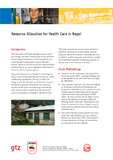Please use this identifier to cite or link to this item:
https://hdl.handle.net/20.500.14356/287| Title: | Resource Allocation for Health Care in Nepal |
| Authors: | GTZ/GFA Consulting Group GmbH |
| Issue Date: | 2009 |
| Publisher: | GTZ/GFA Consulting Group GmbH |
| Keywords: | Resource Allocation for Health Care in Nepal |
| Abstract: | Introduction: The Government of Nepal, through its poverty reduction strategy, has made a commitment to the reduction of inter-regional disparities in health expenditure per capita through an appropriate resource allocation formula. However, this has not yet been operationalised and there has not yet been a significant reallocation of resources in favour of poor regions. Most of the Department of Health Services budget in Nepal is spent on Essential Health Care Services, which include drug expenditures. The way in which this budget is planned, allocated and disbursed is critical to the effective operation of health services. The main resources in the system are staff, drugs and funds for other recurrent costs. Around 40 percent of overall recurrent expenditure is managed at the district level. This study examines the current system of resource allocation, focussing on recurrent funds, essential drugs and district-level systems. It identifies the areas in which it could be improved, and outlines a possible new needs-based approach to allocating resources to districts and, within districts, to facilities. |
| URI: | http://103.69.126.140:8080/handle/20.500.14356/287 |
| Appears in Collections: | Post Graduate Grant (PG) Reports |
Files in This Item:
| File | Description | Size | Format | |
|---|---|---|---|---|
| Resource Allocation for Health Care_Policy Brief (Final Print) (2).pdf | Research Report | 250.65 kB | Adobe PDF |  View/Open |
Items in DSpace are protected by copyright, with all rights reserved, unless otherwise indicated.
